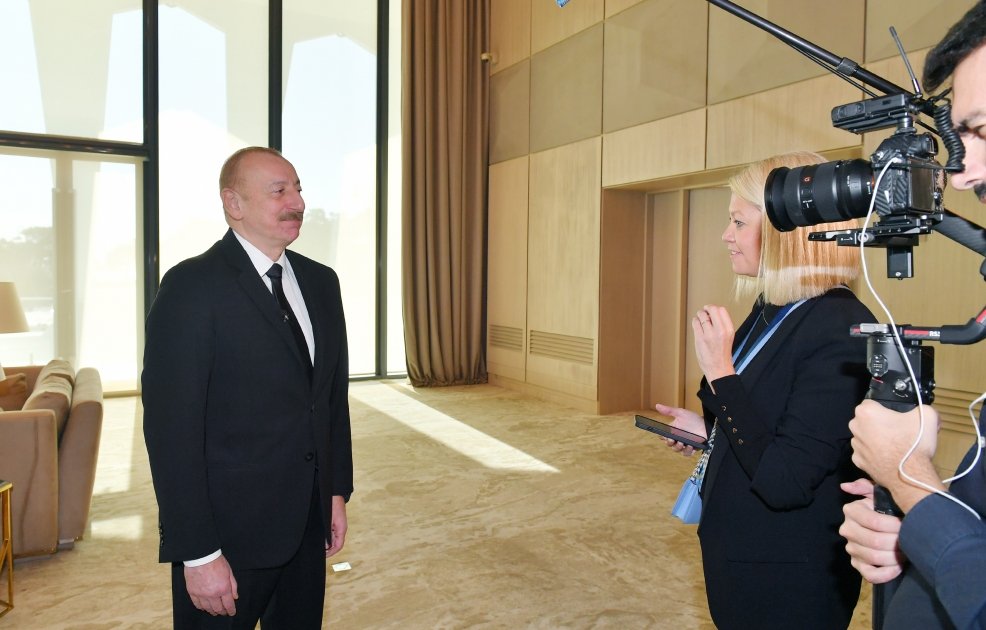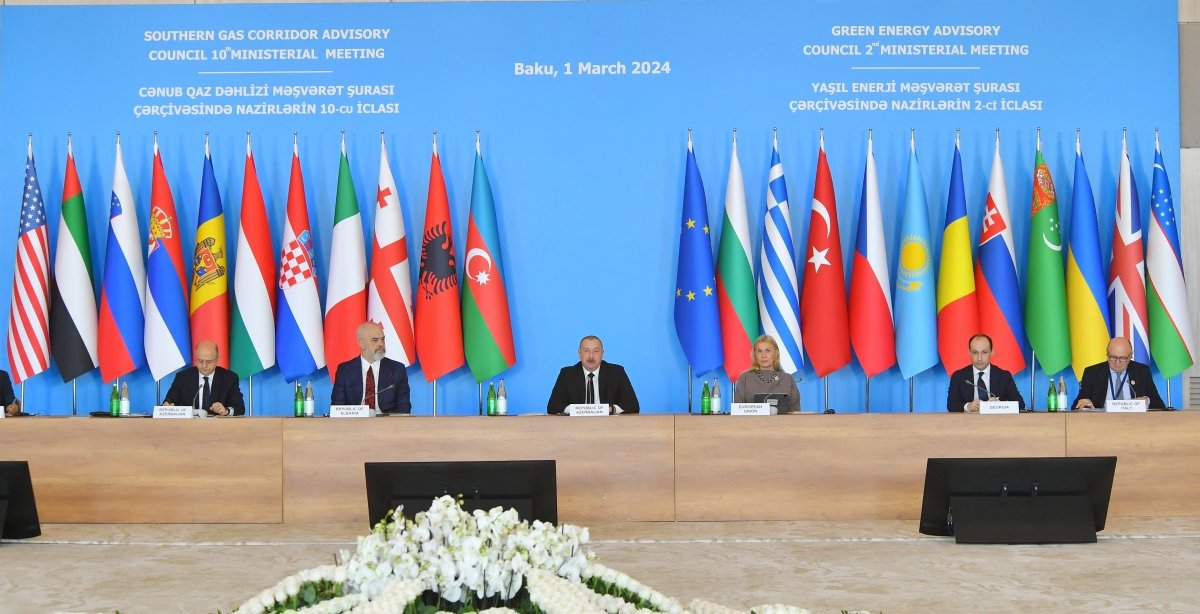BAKU, Azerbaijan, March 4. People worldwide are catching on to the idea that the future of our economies and the planet hinges on embracing eco-friendly practices. Last year, global growth in CO2 emissions was much slower, compared to the economic growth. This is largely because we are leaning more towards clean energy. And Azerbaijan, a country that has leaned on oil and gas resources for years, is now showing how to take the plunge into a green economy, setting an example.
It has only been a few years since Azerbaijan started to extensively implement green technologies throughout the country. Massive areas, like the economic regions of Karabakh and Zangezur, have been designated as clean energy zones. Already, the country is showcasing impressive achievements in this field. And here is the twist - this is all while staying true to its commitments to partners, powering nearly a third of Europe with gas.
In his interview with Euronews, President of Azerbaijan Ilham Aliyev rightly noted that it is countries endowed with oil and gas resources, such as Azerbaijan, that should take the lead in the green transition trend.
"I think this is part of our overall green agenda and our feeling of responsibility, because the country rich with fossil fuel should be among the frontrunners in green transition. We do it not because we lack traditional resources, but because we want to contribute using the financing, using the revenues, which we get from oil and gas sales, to invest in renewables and to create a common understanding about the need for that," President Ilham Aliyev said.

Hosting the COP29 conference this year, Azerbaijan is getting the chance to, first, prove it has earned the trust of other countries in hosting this massive global event, and second, to share with everyone about its successfully executed strategy.
The energy landscape in Europe, with Azerbaijan on board, is transforming at a lightning pace. It is safe to say that rarely before have we seen the implementation of such massive projects in such a short span - specifically the Southern Gas Corridor project.
Just on March 1, in Baku, the 10th Southern Gas Corridor Advisory Council Ministerial Meeting brought together top-notch energy companies, heads of energy departments from major European countries, partners from Central Asia, the Arab world, and many others, all sitting around one table. They gathered to get the lowdown on Azerbaijan's innovations and strides in the energy sector from the chief instigator of the Southern Gas Corridor project, President Ilham Aliyev.
"Today's geopolitical situation in Eurasia proves exactly what we needed to do. In the case of Azerbaijan, the Southern Gas Corridor is absolutely a new route, with now many extensions and interconnectors. The Azerbaijani gas is a new source. So here, in this format, and in the project, which we initiated, we see full implementation of energy diversification issues," President Ilham Aliyev said, as he addressed the meeting.
Those who attended the meeting yesterday expressed appreciation for Azerbaijan's substantial contribution to the region's energy security. European Commissioner Kadri Simson made it clear that, Azerbaijan is considered a reliable natural gas supplier throughout Europe. She pointed out that, since the Southern Gas Corridor started delivering gas a little over three years ago, exports have doubled. In just 2023, Azerbaijan pumped more than 11 bcm of gas into European countries. Representatives from Albania, Greece, Bulgaria, Italy, Slovenia, Georgia, and Türkiye, among many others, reaffirmed their commitment to advancing the SGC project. They are determined to enhance the supply of natural gas from Azerbaijan, underlining their strong support for the project's further development.
They are doing a commendable job on their part as well. For instance, Greece is working on expanding the capacity of the Trans-Adriatic Pipeline - a European leg of SGC. The country is launching new projects for the modernization of export infrastructure, such as the LNG facility in Alexandroupolis and pipelines connecting Bulgaria and North Macedonia. Another example is Serbia, which aims to triple the imports of Azerbaijani gas in the coming years since the Serbia-Bulgaria Interconnector was put into operation in 2023-end.
For those thinking the Caspian does not have enough resources for a significant boost in supplies, Baku has a solid answer. Starting next year's first quarter, natural gas extraction kicks off as part of the deepwater project at the Azeri-Chirag-Gunashli block. We are looking at around half a billion cubic meters at the start, but over the next few years, that figure will jump about fivefold. It will be an extra source of gas alongside the Shah Deniz and Absheron fields. Azerbaijan is also gearing up for the second phase of the Umid gas-condensate field, possibly adding 2-3 bcm over the next 3-4 years. Plus, there are proposals from several foreign investors to start pumping from Umid, Babek, Shafag, Asiman, and Karabakh oil and gas-condensate fields.
Moreover, the event featured the Green Energy Advisory Council Ministerial Meeting, marking its second consecutive year. Azerbaijan's renewable energy projects have shown impressive progress. Following the last SGC gathering in Baku in February 2023, Azerbaijan unveiled its first major 230 MW solar power plant in October. The plant was constructed by the UAE's Masdar, a giant in the renewable energy field. This milestone marks just the start of Azerbaijan's renewable energy journey. As per signed contracts and memoranda of understanding, the country aims to bring online up to 5 GW of solar and wind energy by 2030.
So, during the event, we got some forward-looking moves on paper - like a memorandum with WindEurope, sealing the deal with Nobel Energy for a 100 MW solar power plant, and Elecnor for a 70 MW wind power project.
Moving towards green energy is particularly important in the fight against climate change. Azerbaijan, hosting the COP29 conference this year, has a chance to demonstrate how to change its agenda. Everyone at the event also agreed and supported Azerbaijan in hosting COP29.
"Being a country with fossil fuel, of course, is not our fault. It's our, I think, achievement that we managed to avoid a so-called oil curse that many countries with oil and gas reserves have faced. We transformed oil into development. We managed to provide a fair distribution of wealth. We reduced poverty in Azerbaijan during the last 20 years from 50% to 5%. And all what you see here in Baku is absolutely new development of infrastructure and improvement of living conditions of the people. So, the narrative now, unfortunately, is that fossil fuel is something dangerous, which is bad, and the countries having these resources must be blamed for that. My message was that judge us by what we do, how we treat it, how we use revenues in order to address the needs of the people and stimulate the green agenda," said President Ilham Aliyev in an interview with Euronews on the sidelines of the gathering.
And indeed, Baku is taking on ambitious yet completely achievable goals, given that the country has all the necessary conditions for the development of green energy. There are already solar and wind power stations built, and ongoing construction is in the works, establishing capacities for the production and export of green energy, including hydrogen, are also underway. So, with Azerbaijan hosting COP29 this year, it is set to be a prime example of successfully combining traditional and renewable energy sources.







